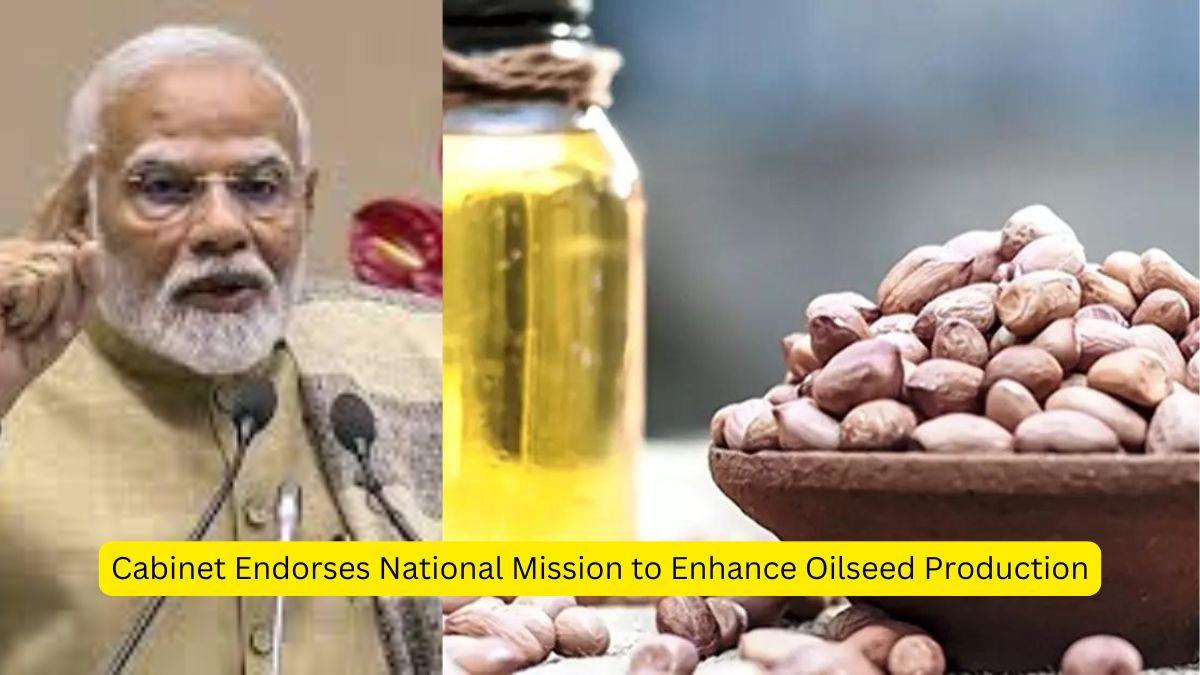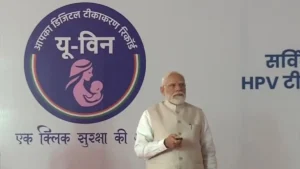The Union Cabinet, chaired by the Prime Minister Shri Narendra Modi, has approved the National Mission on Edible Oils – Oilseeds (NMEO-Oilseeds), a landmark initiative aimed at boosting domestic oilseed production and achieving self-reliance (Atmanirbhar Bharat) in edible oils.
Aim of the mission
- To increase primary oilseed production from 39 million tonnes (2022-23) to 69.7 million tonnes by 2030-31. To make India self-reliant in oilseed production in the next 7 years.
BackGround
- The country is heavily reliant on imports which account for 57% of its domestic demand for edible oils.
- To address this dependency and promote self-sufficiency, the Government of India has undertaken a series of measures to enhance domestic production of edible oils, including the launch of National Mission on Edible Oils – Oil Palm (NMEO-OP) with an outlay of Rs 11,040 crore to boost oil palm cultivation in the country in 2021.
- In addition, the Minimum Support Price (MSP) for mandated edible oilseeds has been significantly increased to ensure remunerative prices to the oilseed farmers.
- The continuation of the Pradhan Mantri Annadata Aay Sanrakshan Abhiyan (PM-AASHA) ensures that oilseed farmers receive MSP through price support scheme and price deficiency payment scheme.
- Besides, 20% import duty on edible oils has been imposed to protect domestic producers from cheap imports and encourage local cultivation.
Objective: To boost domestic oilseed production and achieve self-reliance (Atmanirbhar Bharat) in edible oils.
Implementation Period: The mission will be executed over a seven-year span from 2024-25 to 2030-31.
Financial Outlay: The mission has a total financial outlay of Rs 10,103 crore.
Key Goals of the Mission
- Increase Oilseed Production
- Targeting an increase in primary oilseed production from 39 million tonnes (2022-23) to 69.7 million tonnes by 2030-31.
- Together with NMEO-OP (Oil Palm), it aims to produce 25.45 million tonnes of domestic edible oil, meeting around 72% of projected domestic requirements.
- Focus on Key Crops
- Enhancing production of key oilseed crops: Rapeseed-Mustard, Groundnut, Soybean, Sunflower, and Sesamum.
- Increasing collection and extraction efficiency from secondary sources like Cottonseed, Rice Bran, and Tree Borne Oils.
- Adoption of High-Yielding Varieties
- Promoting the use of high-yielding, high oil content seed varieties.
- Extending cultivation into rice fallow areas and promoting intercropping.
- Use of Modern Technologies
- Harnessing global technologies, including genome editing, for high-quality seed development.
- Online Seed Plan
- Introduction of an Online 5-year rolling seed plan via the ‘Seed Authentication, Traceability & Holistic Inventory (SATHI)’ Portal.
- States can establish advance tie-ups with seed-producing agencies (cooperatives, Farmer Producer Organizations, government, or private corporations).
- Seed Production Infrastructure
- Establishment of 65 new seed hubs and 50 seed storage units in the public sector.
Value Chain and Farmer Support
- Development of over 600 Value Chain Clusters across 347 unique districts, covering more than 10 lakh hectares annually.
- Managed by value chain partners (FPOs (Farmer Producer Organization), cooperatives, public/private entities).
- Access to high-quality seeds, training on Good Agricultural Practices (GAP), and advisory services on weather and pest management.
Expansion and Support
- The Mission also seeks to expand oilseed cultivation by an additional 40 lakh hectares by targeting rice and potato fallow lands, promoting intercropping, and promoting crop diversification.
- Support will be extended to FPOs, cooperatives, and industry players to establish or upgrade post-harvest units, enhancing recovery from sources such as cottonseed, rice bran, corn oil, and Tree-Borne Oils (TBOs).
Awareness
- The Mission will promote awareness of recommended dietary guidelines for edible oils through an Information, Education, and Communication (IEC) campaign.
Expected Benefits
- Aims to significantly boost domestic oilseed production, reducing import dependency.
- Contributes to conserving foreign exchange and enhancing farmers’ incomes.
- Promotes low water usage, improves soil health, and utilizes crop fallow areas productively.
| Summary/Static | Details |
| Why in the news? | The Union Cabinet, chaired by the Prime Minister Shri Narendra Modi, has approved the National Mission on Edible Oils – Oilseeds (NMEO-Oilseeds), a landmark initiative aimed at boosting domestic oilseed production |
| Mission Aim | To increase domestic oilseed production from 39 million tonnes (2022-23) to 69.7 million tonnes by 2030-31. |
| Financial Outlay | Rs 10,103 crore |
| Implementation Period | 7 years (2024-25 to 2030-31) |
| Current Reliance on Imports | India imports 57% of its edible oils to meet domestic demand. |
| Key Goals |
|
| Technologies |
|
| Seed Production Infrastructure | Establish 65 new seed hubs and 50 seed storage units in the public sector. |




 Three Major Inland Waterways Projects Op...
Three Major Inland Waterways Projects Op...
 UN Road Safety Fund Launched Road Safety...
UN Road Safety Fund Launched Road Safety...
 PM Narendra Modi Launches Nationwide HPV...
PM Narendra Modi Launches Nationwide HPV...








